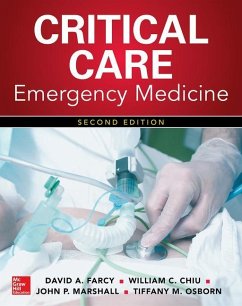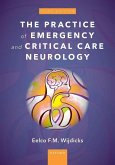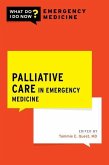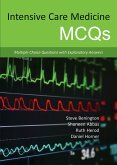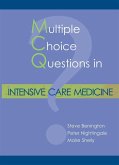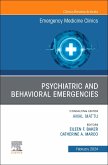- Gebundenes Buch
- Merkliste
- Auf die Merkliste
- Bewerten Bewerten
- Teilen
- Produkt teilen
- Produkterinnerung
- Produkterinnerung
Suitable for all clinicians who wish to understand the overlap between emergency medicine and critical care, this text focuses on critical care emergency medicine. It teaches emergency physicians everything they must know and do to better care for critically ill patients in an emergency department or to provide care in an ICU.
Andere Kunden interessierten sich auch für
![Tintinalli's Emergency Medicine Manual, Eighth Edition Tintinalli's Emergency Medicine Manual, Eighth Edition]() Rita CydulkaTintinalli's Emergency Medicine Manual, Eighth Edition89,99 €
Rita CydulkaTintinalli's Emergency Medicine Manual, Eighth Edition89,99 €![The Practice of Emergency and Critical Care Neurology The Practice of Emergency and Critical Care Neurology]() Wijdicks, Eelco F. M., MD, PhD, FACP (Profes Professor of NeurologyThe Practice of Emergency and Critical Care Neurology235,99 €
Wijdicks, Eelco F. M., MD, PhD, FACP (Profes Professor of NeurologyThe Practice of Emergency and Critical Care Neurology235,99 €![Palliative Care in Emergency Medicine Palliative Care in Emergency Medicine]() Palliative Care in Emergency Medicine51,99 €
Palliative Care in Emergency Medicine51,99 €![Intensive Care Medicine McQs Intensive Care Medicine McQs]() Dr Shoneen AbbasIntensive Care Medicine McQs46,99 €
Dr Shoneen AbbasIntensive Care Medicine McQs46,99 €![McQs in Intensive Care Medicine McQs in Intensive Care Medicine]() Dr Steve BeningtonMcQs in Intensive Care Medicine41,99 €
Dr Steve BeningtonMcQs in Intensive Care Medicine41,99 €![Psychiatric and Behavioral Emergencies, an Issue of Emergency Medicine Clinics of North America Psychiatric and Behavioral Emergencies, an Issue of Emergency Medicine Clinics of North America]() Psychiatric and Behavioral Emergencies, an Issue of Emergency Medicine Clinics of North America109,99 €
Psychiatric and Behavioral Emergencies, an Issue of Emergency Medicine Clinics of North America109,99 €![Echocardiography Echocardiography]() Camelia Demetrescu (Guyâ s and St Thomasâ Hospitals, London, UK)Echocardiography77,99 €
Camelia Demetrescu (Guyâ s and St Thomasâ Hospitals, London, UK)Echocardiography77,99 €-
-
-
Suitable for all clinicians who wish to understand the overlap between emergency medicine and critical care, this text focuses on critical care emergency medicine. It teaches emergency physicians everything they must know and do to better care for critically ill patients in an emergency department or to provide care in an ICU.
Produktdetails
- Produktdetails
- Verlag: McGraw-Hill Education - Europe
- 2 ed
- Seitenzahl: 720
- Erscheinungstermin: 23. Dezember 2016
- Englisch
- Abmessung: 277mm x 218mm x 33mm
- Gewicht: 2026g
- ISBN-13: 9780071838764
- ISBN-10: 0071838767
- Artikelnr.: 44789281
- Herstellerkennzeichnung
- Libri GmbH
- Europaallee 1
- 36244 Bad Hersfeld
- gpsr@libri.de
- Verlag: McGraw-Hill Education - Europe
- 2 ed
- Seitenzahl: 720
- Erscheinungstermin: 23. Dezember 2016
- Englisch
- Abmessung: 277mm x 218mm x 33mm
- Gewicht: 2026g
- ISBN-13: 9780071838764
- ISBN-10: 0071838767
- Artikelnr.: 44789281
- Herstellerkennzeichnung
- Libri GmbH
- Europaallee 1
- 36244 Bad Hersfeld
- gpsr@libri.de
David Farcy, MD, FAAEM, FACEP, FCCM (Miami Beach, FL) is Chair of Emergency Medicine, Director of Emergency Medicine Critical Care, Medical Director of the Surgical Intensivist, Mount Sinai Medical Center, Miami Beach, Florida.Michael C. Chiu, MD, FACS (Baltimore, MD) Associate Professor of Surgery, Medical Director, Surgical ICU, Program Director, Surgical Critical Care and EM Critical Care, University of Maryland Medical System, Adam Cowley Shock Trauma Center. John Marshall, MD (Brooklyn, NY) Chairman, Department of Emergency Medicine, Maimonides Medical Center.Tiffany Osborn, MD (St Louis, MO) Associate Professor, Surgery Acute and Critical Care Surgery, Washington University.
1. The Emergency Department Intensivist
2. The Difficult Airway
3. The Failed Airway
4. Mechanical Ventilation
5. Weaning and Extubation
6. Noninvasive Ventilation
7. ECMO
8. Acute Respiratory Failure
9. Acute Respiratory Distress Syndrome
10. Severe Asthma and COPD
11. Pulmonary Embolism
12. Hemodynamic and Perfusion Monitoring
13. Acute Coronary Syndrome
14. Hypertensive Crisis
15. Post Cardiac Arrest Managment
16. Vasopressors and Inotropes
17. Management after Cardiac Surgery
18. Pericardial Disease
19. GI Bleed
20. Acute Liver Failure
21. Acid-Base Disorders
22. Electrolyte Disorders
23. Acute Renal Failure
24. Altered Mental Status
26. Intracranial Hypertension
27. Stroke
28. Intracranial Hemorrhage
29. Traumatic Brain/Spinal Injury
30. Tranfusions
31. Deep Venous Thrombosis
32. Hyperglycemic Emergency
33. Glucose Management
34. Approach to Fever
35. Antimicrobial Use
36. Sepsis and Septic Shock
37. Nosocomial and Health Care-Associated Pneumonia
38. Infectious Endocarditis
39. Clostridium Difficile Infection
40. Poisoning
41. Acetominophen Overdose
42. Salicylate Overdose
43. CO Poisoning
44. Point of Care Echocardiography
45. Ultrasound Guided Procedures
46. Shock Classification
47. Fluid Management
48. Nutritional Support
49. Percutaneous Tracheostomy
50. Therapeutic Hypothermia
51. Pediatric Considerations
52. Transportation
53. End of Life Care
2. The Difficult Airway
3. The Failed Airway
4. Mechanical Ventilation
5. Weaning and Extubation
6. Noninvasive Ventilation
7. ECMO
8. Acute Respiratory Failure
9. Acute Respiratory Distress Syndrome
10. Severe Asthma and COPD
11. Pulmonary Embolism
12. Hemodynamic and Perfusion Monitoring
13. Acute Coronary Syndrome
14. Hypertensive Crisis
15. Post Cardiac Arrest Managment
16. Vasopressors and Inotropes
17. Management after Cardiac Surgery
18. Pericardial Disease
19. GI Bleed
20. Acute Liver Failure
21. Acid-Base Disorders
22. Electrolyte Disorders
23. Acute Renal Failure
24. Altered Mental Status
26. Intracranial Hypertension
27. Stroke
28. Intracranial Hemorrhage
29. Traumatic Brain/Spinal Injury
30. Tranfusions
31. Deep Venous Thrombosis
32. Hyperglycemic Emergency
33. Glucose Management
34. Approach to Fever
35. Antimicrobial Use
36. Sepsis and Septic Shock
37. Nosocomial and Health Care-Associated Pneumonia
38. Infectious Endocarditis
39. Clostridium Difficile Infection
40. Poisoning
41. Acetominophen Overdose
42. Salicylate Overdose
43. CO Poisoning
44. Point of Care Echocardiography
45. Ultrasound Guided Procedures
46. Shock Classification
47. Fluid Management
48. Nutritional Support
49. Percutaneous Tracheostomy
50. Therapeutic Hypothermia
51. Pediatric Considerations
52. Transportation
53. End of Life Care
1. The Emergency Department Intensivist
2. The Difficult Airway
3. The Failed Airway
4. Mechanical Ventilation
5. Weaning and Extubation
6. Noninvasive Ventilation
7. ECMO
8. Acute Respiratory Failure
9. Acute Respiratory Distress Syndrome
10. Severe Asthma and COPD
11. Pulmonary Embolism
12. Hemodynamic and Perfusion Monitoring
13. Acute Coronary Syndrome
14. Hypertensive Crisis
15. Post Cardiac Arrest Managment
16. Vasopressors and Inotropes
17. Management after Cardiac Surgery
18. Pericardial Disease
19. GI Bleed
20. Acute Liver Failure
21. Acid-Base Disorders
22. Electrolyte Disorders
23. Acute Renal Failure
24. Altered Mental Status
26. Intracranial Hypertension
27. Stroke
28. Intracranial Hemorrhage
29. Traumatic Brain/Spinal Injury
30. Tranfusions
31. Deep Venous Thrombosis
32. Hyperglycemic Emergency
33. Glucose Management
34. Approach to Fever
35. Antimicrobial Use
36. Sepsis and Septic Shock
37. Nosocomial and Health Care-Associated Pneumonia
38. Infectious Endocarditis
39. Clostridium Difficile Infection
40. Poisoning
41. Acetominophen Overdose
42. Salicylate Overdose
43. CO Poisoning
44. Point of Care Echocardiography
45. Ultrasound Guided Procedures
46. Shock Classification
47. Fluid Management
48. Nutritional Support
49. Percutaneous Tracheostomy
50. Therapeutic Hypothermia
51. Pediatric Considerations
52. Transportation
53. End of Life Care
2. The Difficult Airway
3. The Failed Airway
4. Mechanical Ventilation
5. Weaning and Extubation
6. Noninvasive Ventilation
7. ECMO
8. Acute Respiratory Failure
9. Acute Respiratory Distress Syndrome
10. Severe Asthma and COPD
11. Pulmonary Embolism
12. Hemodynamic and Perfusion Monitoring
13. Acute Coronary Syndrome
14. Hypertensive Crisis
15. Post Cardiac Arrest Managment
16. Vasopressors and Inotropes
17. Management after Cardiac Surgery
18. Pericardial Disease
19. GI Bleed
20. Acute Liver Failure
21. Acid-Base Disorders
22. Electrolyte Disorders
23. Acute Renal Failure
24. Altered Mental Status
26. Intracranial Hypertension
27. Stroke
28. Intracranial Hemorrhage
29. Traumatic Brain/Spinal Injury
30. Tranfusions
31. Deep Venous Thrombosis
32. Hyperglycemic Emergency
33. Glucose Management
34. Approach to Fever
35. Antimicrobial Use
36. Sepsis and Septic Shock
37. Nosocomial and Health Care-Associated Pneumonia
38. Infectious Endocarditis
39. Clostridium Difficile Infection
40. Poisoning
41. Acetominophen Overdose
42. Salicylate Overdose
43. CO Poisoning
44. Point of Care Echocardiography
45. Ultrasound Guided Procedures
46. Shock Classification
47. Fluid Management
48. Nutritional Support
49. Percutaneous Tracheostomy
50. Therapeutic Hypothermia
51. Pediatric Considerations
52. Transportation
53. End of Life Care

